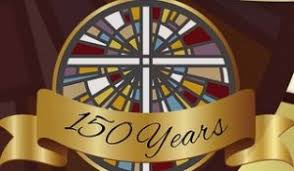See what love the Father has given us, that we should be called children of God; and that is what we are. The reason the world does not know us is that it did not know him. 2 Beloved, we are God's children now; what we will be has not yet been revealed. What we do know is this: when he is revealed, we will be like him, for we will see him as he is.
Fellow children of God,
Here are some reflections on the Church Year, All Saints Day and Advent.
All Saints Day aptly follows Reformation Day. Reformation Day reminds us that none of us is righteous apart from a relationship with Jesus Christ. All Saints Day reminds us of the destiny we all share in common with those that have died in the faith before us. While the Lutheran tradition states that all who believe and are baptized are saved (and thereby are saints) the Catholic church has a tradition that raises the bar much higher. It is easy for Lutherans to be critical of this enterprise of identifying individuals who "deserve" to be considered "saints" as Luther also stated that all Christians are both saints and sinners. Based on this it is easy for Lutherans to dispel the whole Roman Catholic enterprise of beatification of anyone. While I do not quarrel with Luther's notion that faith apart from works is the only prerequisite for sainthood, nonetheless, it is interesting to look at those that the Catholic Church has identified as "saints". Most Lutherans, upon a careful reading of these "saints" would agree that there truly is something exceptional about most of these Christians. They would learn about the courage and resolve of these individuals to stand in opposition to anti-Christian/anti-human totalitarianism when they could have saved their lives by simply staying silent but recognized that such an out would be a betrayal of the Christian faith. Therefor they spoke the truth of the Kingdom of Christ in direct confrontation against the reigning secular powers whose actions betrayed their rebellion of God's Kingdom leading to violations of not only Christian lives but of most people under their rule. So while these heroic Christians are not any more "saints" than any more believer, for the most part these individuals are inspiration not only to Roman Catholics but also to all Christians. By being willing to sacrifice their own self-interest, even their lives, they have been examples to all of us as to what it might mean for us to live out our Christian faith should we find ourselves in similar times?
We do not need to look far. What does it mean to be a Christian in Pakistan? What does it mean to be a Christian in Saudi Arabia? What does it mean to be a Christian in a country that recently declared itself to be secular but under its recent leader has dedicated itself to rebuilding the Muslim Ottoman Empire that threatened Europe for hundreds of years? What does it mean to be a Christian Kurd or a Christian Armenian?
Lest we extend our gaze to "those people out there" what about where you live? What does it mean to be a Christian Democrat or a Christian Republican during this election? I have no doubt that all of you will vote your conscience and your values. But here is the challenge: are individuals who voted opposite you unbelievers or heretics or anti-Americans? Is it possible that those who voted "wrong" might not be condemned by God at the last day? Could it be possible that they too might be saints, according to Luther's understanding?
Here is the most important question. Once this pandemic relents and we go back to our churches (what a glorious day that will be to see you all together instead of one by one just once a month, Kathy and I miss this so much) will we fully embrace our brothers and sisters in Christ (even we stoic types, such as myself might be overcome by such a drought of fellowship might turn into huggers) will we have the same feelings to those who we suspect might have voted opposite us? No easy thing, especially if their "side" won? Are we willing to reject the hyper partisans who might suggest that our fellow parishioners who voted against us should be our enemies? Is the power of our baptism and our adoption into the community of Christ going to be shattered by our partisan preferences? Will we become Judges, Jurys and Executioners? Will self-righteousness overwhelm our Lutheran understanding that we are brothers and sisters in Christ? Should you be so tempted, the founders of Concordia Lutheran did not add to Concordia Lutheran the name "Democrat" or "Republican". Jesus would not join either party when he returns as he will be instituting a Kingdom which is so much better than anything we can comprehend, no matter how dedicated we are to our preferred party.
Upon Christ's return we will be reminded of our status as sinners and his status as Savior. We will experience not our self-righteousness but rather Divine righteousness. Should you object, ask yourself, for whom did Christ go to the cross for? We are all sinners in need of Christ's redeeming. Fellow redeemed sinners are both Democrats and Republicans. These are our brothers and sisters in Christ,
So when we gather together when this pandemic disappears, my guess is that there will be no difference in warm handshakes or hugs, our greetings of each other will not have anything to do with partisan persuasion. It will have to do with our shared common status as Children of God saved not by works but by the blood of His Son and our Savior Jesus Christ.
.
Pastor Bruce




